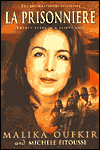 This book is published under the title Stolen Lives: Twenty Years in a Desert Jail in most countries, but the copy I read was a Canadian version, with the title La Prisonniere.
This book is published under the title Stolen Lives: Twenty Years in a Desert Jail in most countries, but the copy I read was a Canadian version, with the title La Prisonniere.Malika Oufkir was born into a proud Berber family in 1953, the eldest daughter of the King of Morocco's closest aide. She was adopted by the king to be a companion to his little daughter, and at the royal court of Rabat, Malika grew up locked away in a golden cage, among the royal wives and concubines.
But when Malika was eighteen, in 1972, her father was arrested after an attempt to assassinate the king. General Oufkir was swiftly and summarily executed. Malika, her beautiful mother and her five younger brothers and sisters were seized and thrown into an isolated desert jail. For fifteen years, they had no contact with the outside world, and lived in increasingly barbaric and inhumane conditions.
Like a modern Scheherazade, Malika kept up the spirits of her younger siblings by telling them stories every night about an epic world of her own invention. Then, after fifteen endless years of imprisonment, the Oufkir children managed to dig a tunnel with their bare hands, and made an audacious escape. Although they were recaptured after five days, the ensuing public outrage resulted in house arrest rather than a return to prison. In 1996, Malika was finally permitted to leave Morocco to begin a new life in exile.
La Prisonniere is a heart-rending account of resilience in the face of extreme deprivation, of the courage and even humour with which one family faced their tormented fate. A shocking true story, it is hard to comprehend that it could have happened in our own times.
This book was the July or August book (I think - whichever month it was I am behind!) for one of the groups that I am in. Or more precisely, I probably skirt around the edges of this group now. I used to be fully involved in it, but I find myself not keeping up with all the reading that I need to do for all the different groups I have attached myself to, and this seems to be one that is going by the wayside.
As a read, this was very interesting. It was set in a country that I know very little about, with very different religious and cultural experience to my own, and thankfully much different life experiences to mine.
Malika Oufkir lived a very comfortable life - as a very young girl she was even adopted by the King of Morocco so that she could be a playmate for his young daughter. However, Malika's opulent lifestyle was very often tinged with loneliness as she missed her parents, and the brothers and sisters that she barely knew. Her early life is portrayed as a gilded prison.
When she was in her late teenage years her father lead a coup against the King, and was executed. As a result of his actions, the Oufkir family were all arrested and then transported to a variety of different prisons across the country - each feature terrible living conditions, incredible isolation. In some cases they were kept in their cells 24 hours a day, unable to see or touch there loved ones who were kept in separate cells, but they found ingenious ways to keep in communication with their family members, and to not let their spirits be defeated by their oppressors.
When several of the family escape after many, many years of incarceration, and manage to get their story out, things begin to change. The family is released from prison into house arrest, allowing for some freedom, but it is a hard adjustment for them to make, and then ultimately to freedom outside of Morocco. Her youngest brother was just 3 years old when he was imprisoned, so for him to come out into the world having been incarcerated for so many years, through his childhood, and teenage years, must have been terribly overwhelming.
As a life story Malika Oufkir's is certainly very dramatic, and very interesting to read, and for the most part it was very well written. There were occasional times through the book that felt a little stilted, but for the most part, it was quite good. I am also not sure how much of that "stiltedness" would come from the fact that the book was not only an autobiography, but it was also translated from French to English for publishing. I noted with interest that she has a new book out called Freedom: The Story of My Second Life, which I will definitely read if I can find it.
I think that writing an autobiography would actually be pretty hard - details that certain people find fascinating would bore others to tears, needs to be well written without being monotonous, need to portray your life story in a variety of shades in several ways. For example, whilst you are telling your story there would presumably still be parts of yourself that you want to keep private. Sorry, just random musings there!!
Rating 4/5







No comments:
Post a Comment